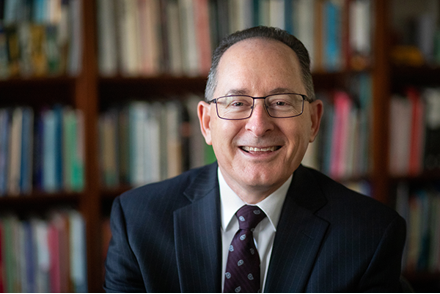State Super to Aspiring Educators: ‘Make Your Voices Heard’
Next January 8 will mark 20 years since President George W. Bush signed No Child Left Behind (NCLB) – federal legislation that ushered in a destructive era of high-stakes standardized testing and so-called “accountability” for educators and public schools.
Michigan State Superintendent Michael Rice noted the upcoming anniversary during a wide-ranging, hour-long virtual chat last week with Aspiring Educators of Michigan (AEM)—college and university students who belong to MEA’s pre-professional arm.

“I share that fact to say, though the last two decades have been very, very difficult, I think we’re beginning to turn the corner on some of these policy questions,” Rice told about 40 assembled AEM members and leaders, whose K-12 education was influenced by NCLB and its successors.
The former Kalamazoo Public Schools superintendent, who began his career as a high school French teacher in Washington, D.C., encouraged the future educators to understand where education and politics intersect and to be prepared to influence what turns are taken at those crossroads.
“You have to realize that there’s the fight in individual schools every day to do what’s right for children, and there’s a broader fight – in a larger world – to make sure we’re heading in a proper policy direction,” Rice said. “And if we aren’t, educators must make their voices heard.”
Every one of the eight long-term education goals approved by the State Board of Education in 2020 – from expansion of early childhood education to beefing up student mental health services and addressing the teacher shortage – will be won or lost in the political arena, he said.
In Michigan, much damage has resulted from policies enacted since 2011: business tax cuts and slashed per-pupil funding, reduced health care and retirement benefits, burdensome educator evaluations, and attacks on collective bargaining rights. “We as educators can’t shy away from politics if we expect to serve our children in education,” Rice said.
In answer to a question about current controversies over masks and teaching on issues of race, Rice said the State Board supports the ability of public health officials and local school leaders to issue mask mandates when needed, and he has made the case far and wide for truth in education.
While “Critical Race Theory” is not taught in K-12 schools, “Race and racism are an integral part of our history and need to be taught as part of the full breadth of U.S. history,” he said.
Progress has been made this year on school funding with a state education budget that includes historic per-pupil funding; $240 million for more nurses, counselors, social workers, and psychologists; and broad expansion in the number of four-year-olds enrolled in high-quality public preschool.
“That’s a tribute to the advocacy of organizations like the MEA and AFT Michigan,” he said. “That couldn’t have happened unless educators moved into the political space to make it happen.”
Much work remains, but Rice believes support for high-stakes testing has peaked and is waning. Messages from a diverse coalition of advocates are winning instead – favoring adequate funding and resources for schools and classrooms that students and educators need to be successful, he said.
Meanwhile, the Michigan Department of Education has proposed rebuilding the profession with scholarships for high school and college students who choose education careers – plus loan forgiveness for those in the field and better mentoring for early career educators, among other ideas.
No other job provides such an opportunity to influence children’s lives, so his advice to aspiring educators is to follow their heart. “There is no greater profession, and now is an outstanding time to enter into public education because the pendulum is shifting. I say, if this is your calling, welcome.”



